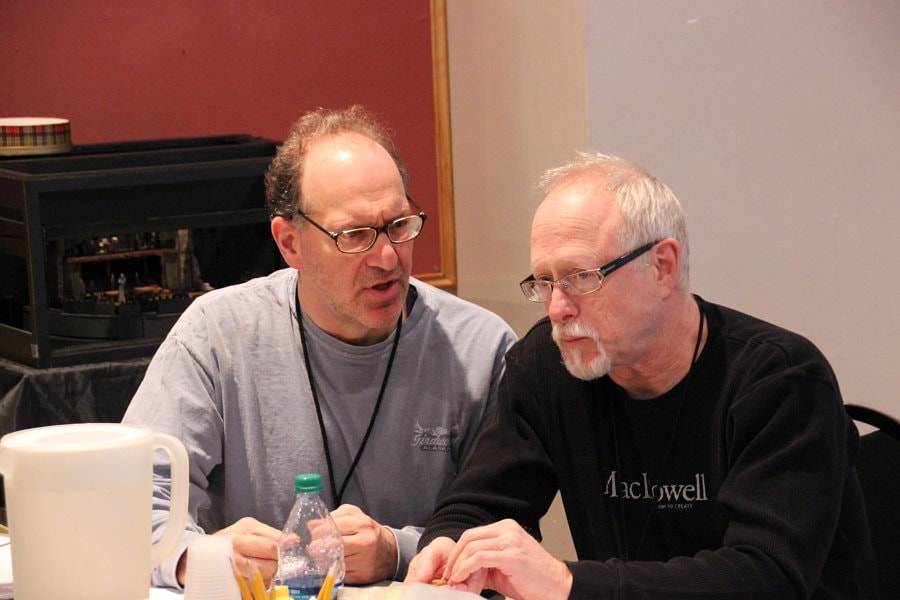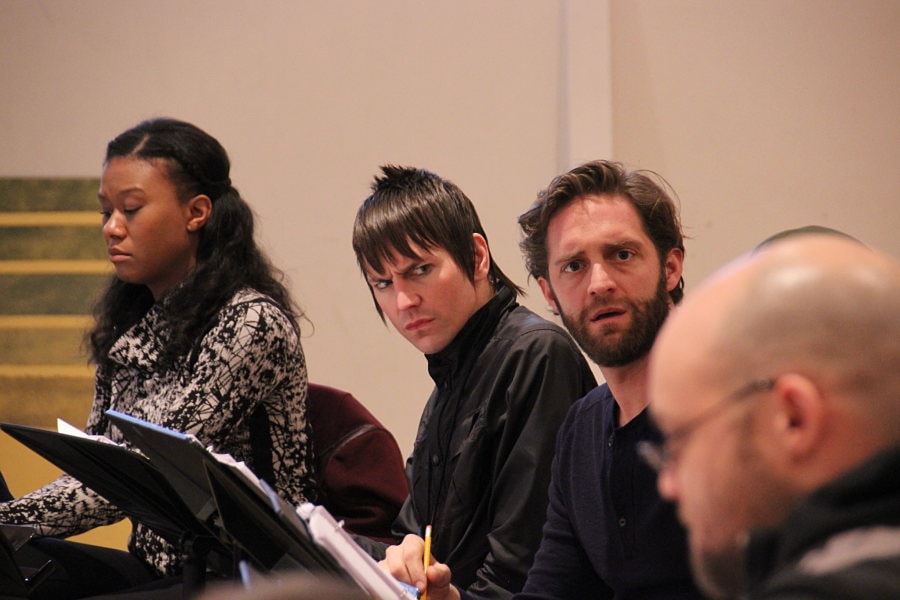DENVER: Robert Schenkkan had just written two plays about a charismatic leader who made a world-changing difference in millions of people’s lives, despite the meddling and misunderstanding of his inferiors. So what better way to follow up All the Way and The Great Society—a pair of historical dramas about President LBJ’s struggle to pass landmark civil rights and public welfare legislation, where the former play went to Broadway and nabbed a best play Tony—than to write about Jesus and his squabbling, imperfect disciples?
Though the new rock musical The 12 didn’t begin as Schenkkan’s idea, its themes seem like a natural fit for the Pulitzer-winning playwright, who also wrote The Kentucky Cycle, Handler and By the Waters of Babylon—works infused with history and politics as much as intimate human drama. The 12, which premieres at Denver Center Theatre Company March 27–April 26 under Richard Seyd’s direction, began as a concept by composer/lyricist Neil Berg, who initially had the idea of “conflating iconic rock figures with the apostles,” said Schenkkan in a recent phone interview. That specific idea appealed to him less than the notion of “both Christianity and rock and roll as revolutionary moments.”
He was also drawn to the story Berg was interested in telling: the tense, confusing three days between Jesus’s crucifixion and what Christians believe was his resurrection.
“It’s an interesting aspect of the passion story which I’d never seen dramatized,” said Schenkkan. “It’s after the crucifixion, and everything has gone to hell in a handbasket. The disciples had arrived in Jerusalem as part of a triumphant movement, but now their leader is dead, they’re being hunted, everything they’ve believed in and sacrificed their lives for has been blown up.”

Traditionally the disciples were said to retreat to an “upper room,” in many accounts the site of what had been their last supper with Jesus, until reports that Jesus’s tomb was empty—and that some in the group had seen and spoken with their slain leader—began to spread.
“Essentially, they’re hiding out, but 72 hours later they leave the room having somehow overcome their terror and their grief, their sense of betrayal, ready to preach a whole new doctrine,” said Schenkkan.
So what happened in the interim? Given that Jesus is not listed as a character in the playbill, we can assume that Berg and Schenkkan’s answer is not the obvious reverential one. But, as Schenkkan explained, there are sound dramaturgical and even theological reasons to leave the purported grave-break offstage.
“The news of the open tomb is received, but the interpretation of what that means is left for the group to work out,” Schenkkan said. “My feeling is, if you literally saw the risen Christ standing in front of you, if you could put your fingers in his wounds, that would make the act of belief pretty straightforward. For all contemporary believers, that doesn’t happen, so it’s a leap of faith. And that’s what we’re interested in—it’s more dramatic and more human.”
For Berg, the dramatic pressure cooker of the upper room, with the disciples in hot contention with each other, lends itself naturally to the intensity of rock.
“Tension, angst, revolution—these are hard, angular emotions,” said Berg, whose credits include an Off-Broadway musical version of The Prince in the Pauper and an in-development musical adaptation of the film Grumpy Old Men. “It’s a gift from the musical gods, all those emotions. It’s boiling, they’re sweating, they’re trapped in this room with their emotions so high, it’s about to explode.”
Berg called his score “an open love letter to the genre, from the Who to Led Zeppelin” to hip-hop and beyond. One early workshop of The 12 featured Danny Spitz, of the thrash-metal band Anthrax, on guitar. “I was looking for that bite, that shredding darkness,” Berg explained.
Jesus and rock music are hardly theatrical strangers, of course, but both Berg and Schenkkan stress that The 12 is not simply a sequel to Jesus Christ Superstar or Godspell.
“This is not a sand-and-sandals kind of epic here,” said Schenkkan. “We want to bring a contemporary audience into the emotional life of this situation, so the language is contemporary without being topical, and the design is neutral, modern. What they’re wearing is what young men and women wear today who don’t have a lot of money and aren’t putting a lot of thought into what they wear.
“The game that Neil and I are playing here is to take people who are not usually the center of the story, the ones who are most like us, and make the play about them,” Schenkkan continued. “We’re trying to make this event and these people as accessible as possible, to take away thousands of years of filtering, strip all that down and say, ‘What if? What would you do—how do you go forward?’”
This getting-back-to-the-original impulse sounds a little bit like that of many a Christian reformers and preachers. But Schenkkan, raised a Presbyterian in Texas, said he now classifies himself as “someone who has very deep spiritual yearnings, but not ones that are fulfilled by any contemporary religious movement.”
Berg, for his part, was raised as a traditional but not highly religious Jew in the Bronx. He said he “went through a phase of being angry over organized religion, then I took a better look at it. For me, it’s always been about the question of why people believe.” His first two musicals were called Savior and False Prophets.
So will audiences in Denver be watching a critique or an encomium, a jeremiad or a psalm? That may be in the eye of the beholder.
“Without giving too much away,” said Berg, “we’re excited about the ending—about the difference between how someone might think this show should end, and how it does end.”
Said Schenkkan, “For both of us, the hope was that we could find this sweet spot where we could be simultaneously be respectful of those who are part of a belief community and those who aren’t.”
As Paul, an apostle not depicted in The 12, once put it: “I have become all things to all people.” That’s not just a fine PR strategy for a budding religion; it’s also a pretty good mission statement for a populist rock musical.


